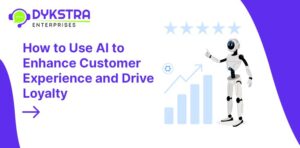
Enhancing customer experience and driving loyalty are amongst the most critical goals that companies pursue if they are serious about their long-term success. Fast business environment changes have made it more important to use Artificial Intelligence to enhance the manner in which customers are being interacted. Predictive analytics, chatbots, and other AI solutions are transforming customer journeys and fostering stronger relationships while demonstrating loyalty that lasts.
-
Personalization at Scale
One of the greatest benefits of AI in customer experience is its ability to deliver personalization at scale. AI can process lots of customer data; it can check the browsing history, the purchases the customer had, and even patterns of engagement to ensure that he or she receives the right product, the right offer, or the right communication. Such a feeling is crucial in terms of loyalty building: known and appreciated by the service provider is more likely to be loyal.
This is realised in services like streaming television use by Netflix, and Amazon making product recommendations through an AI-driven algorithm to fit a specific taste and preference. Similarly, brands can use AI for more conversational marketing messages which are likely to attract repeat engagement.
-
Available at All Times
AI-powered chatbots revolutionize customer care. Customers receive instant responses and resolutions, 24 hours a day, 7 days a week. Since they never need breaks like human agents, they can have parallel conversations and reduce wait times drastically. They can help answer FAQs, address orders, and actually resolve most minor issues so that humans tackle only the complex cases.
Another sophisticated type of chatbot that employs NLP can recognize the intent and emotion of a customer’s queries. In other words, it can be able to have meaningful, human-like conversations so that it may interact with the customers better and, therefore, have better customer satisfaction. The automation of routine questions by an AI-powered chatbot helps smoothen the operations of customer service and improves the overall customer experience.
-
Predictive Analytics for Proactive Service
Predictive analytics, and guided by AI, enables companies to predict customer needs and preferences even before they come to life. Using historical interactions and purchase behaviors, AI can specify when customers will require assistance or when a purchase is probable. Companies can then be ahead in offering timely product recommendations, to reactivate dormant customers, or to offer them special deals.
Predictive analytics can also detect at-risk churning. For example, if a customer’s engagement with a brand starts to slacken, AI can trigger a focused outreach campaign that can help reconnect once again with that customer. Proactive engagement only strengthens loyalty with a customer because it shows that the brand cares about his needs and therefore cares enough about the relationship built.
-
Informed Decision-Making
AI can crunch data beyond human capabilities, giving deep insight into customers’ behavior. Companies can get better ideas about what customers like, dislike, and prefer based on actual data, which helps them understand how much this community is in pain over what issues, creating some trend. For example, with sentiment analysis, one can analyze the emotion behind reviews or social media posts to analyze issues that otherwise might not come to notice. This means product improvement, service adjustments, or even more tailored marketing strategies.
These insights, therefore, will directly guide business decisions related to customers’ satisfaction. Common pain points are identified, for instance, hence and consequently allow companies to streamline processes, eradicate friction, and thus create a smoother and more enjoyable customer experience.
-
Consistency and Quality
AI also ensures consistency in service quality, which is yet another factor for making customers loyal. Automated systems reduce the possibilities of errors that can be involved with human effort and AI-driven tools can offer specific, rather than generalized experiences across all touchpoints. Consistency in experience builds trust and when customers trust a brand, then it is likely to have those customers bound to the brand.
Conclusion
AI is changing the very fabric of customer experience by the power of personalized interactions, proactive service, and improved support capabilities. Carefully designed AI solutions are able to bring almost seamless, engaging, and relevant experience to customers. This immediately meets the needs of customers while generating future loyalty. Business success will lie in the hands of enterprises that skillfully use AI technology to win in this competitive environment, one satisfied customer at a time.
